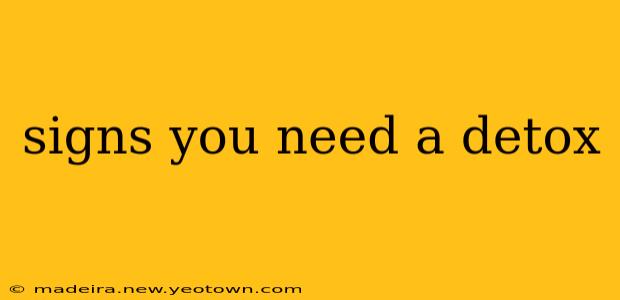Feeling Drained? Signs You Might Need a Detox
Let's be honest, life can be a whirlwind. Between work deadlines, family commitments, and the constant barrage of information, it's easy to feel overwhelmed and sluggish. But what if that feeling of exhaustion goes beyond simple tiredness? What if it's a sign your body is crying out for a reset? This isn't about trendy juice cleanses; it's about recognizing the subtle (and not-so-subtle) signals that you might need a detox – a gentle cleanse for your mind and body.
My journey to understanding the need for detox started with a persistent brain fog. I felt like I was wading through molasses, unable to focus on even simple tasks. It was a gradual decline, so subtle that I initially dismissed it as stress. But then the fatigue hit, a relentless tiredness that no amount of sleep seemed to alleviate. That’s when I knew something had to change.
This article explores the key signs that suggest you might benefit from a detox, addressing common questions and misconceptions along the way. Remember, consulting your doctor before starting any detox program is crucial, especially if you have pre-existing health conditions.
1. Persistent Fatigue: More Than Just Tired
This isn't your usual "I need a coffee" tiredness. We're talking about a deep, bone-aching fatigue that persists even after a full night's sleep. It's the kind of tiredness that makes even simple tasks feel monumental. If you're constantly battling exhaustion despite getting enough rest, it could be a sign your body is struggling to process toxins efficiently.
2. Brain Fog and Difficulty Concentrating
That fuzzy feeling in your head, the inability to focus, the feeling of mental sluggishness—these are classic indicators of a potential need for detoxification. Toxins can interfere with brain function, leading to reduced cognitive performance and impaired memory.
3. Digestive Issues: Bloating, Constipation, or Diarrhea
Your gut is your second brain, and it plays a vital role in detoxification. Persistent bloating, constipation, or diarrhea can signal an imbalance in your gut microbiome, which can hinder your body's natural cleansing processes. Are you regularly experiencing these digestive discomforts? It's time to pay attention.
4. Skin Problems: Acne, Rashes, or Eczema
Your skin is your body's largest organ, and it often reflects internal imbalances. Persistent acne, rashes, eczema, or other skin problems can be a sign that your body is struggling to eliminate toxins effectively. If your skin is screaming for help, it’s a message your body is trying to send.
5. Headaches and Migraines: Frequent and Intense
Frequent headaches, especially migraines, can be linked to toxin buildup in the body. These headaches are often more than just a simple tension headache; they can be debilitating and disruptive to your daily life.
6. Allergies and Sensitivities: Worsening Symptoms
If your allergies or sensitivities are getting progressively worse, it could indicate that your body's detoxification system is overloaded. The body's natural defense mechanisms might be struggling to keep up.
7. Weight Fluctuation: Unexplained Changes
Unexplained weight gain or loss can sometimes be a sign of hormonal imbalance or poor detoxification, although other factors are obviously also at play. This needs a deeper investigation.
8. Persistent Low Mood or Irritability
Toxins can impact your mood and mental well-being. Persistent low mood, irritability, or anxiety can be signs your body is working hard to fight off toxins. This is crucial to consider if you're struggling emotionally.
What to Do If You Recognize These Signs?
The information provided here is for general knowledge and does not constitute medical advice. If you are concerned about your health, consult a healthcare professional. They can help you determine the underlying cause of your symptoms and recommend the best course of action. This might include dietary changes, lifestyle adjustments, or other supportive therapies. A professional can help you design a plan tailored to your specific needs and health status. Remember, a healthy approach prioritizes gradual, sustainable changes that support your overall well-being.

